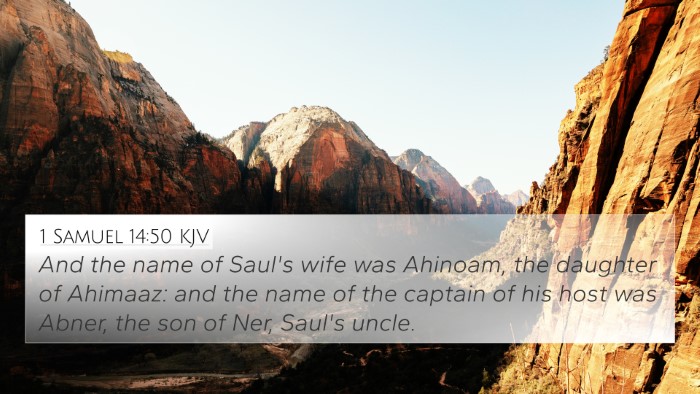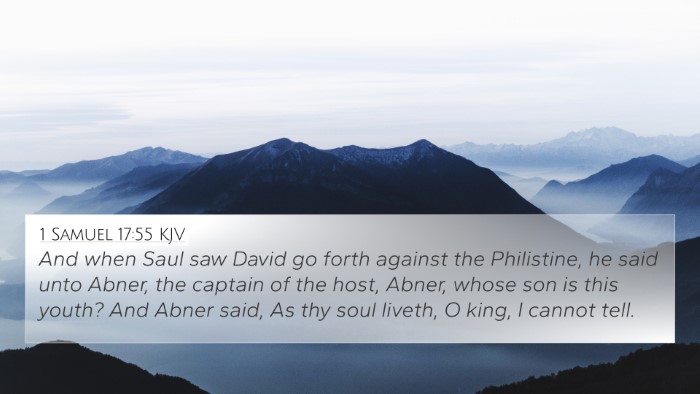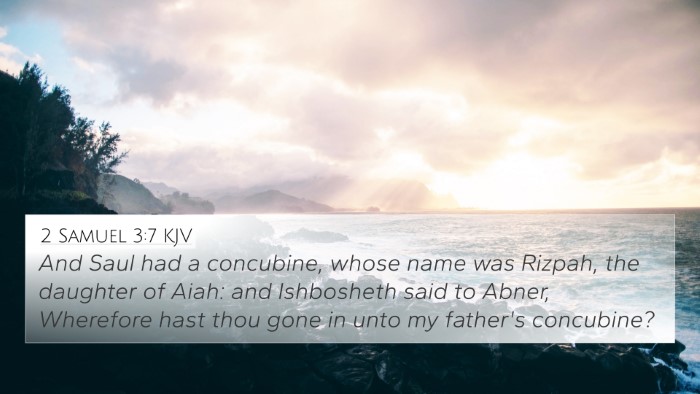Understanding 2 Samuel 2:8
Biblical Context: In 2 Samuel 2:8, we encounter the scene of political struggle and leadership transition after the death of Saul. Abner, the commander of Saul's army, appoints Ishbosheth, Saul's son, as king over Israel, setting the stage for a divided kingdom.
Commentary Insights
This verse illustrates significant themes in the biblical narrative, including the sovereignty of God in appointing rulers and the nature of human authority in the face of divine will. The choice of Ishbosheth as king represents a faction's loyalty to Saul’s house, contrasting with David's claim to the throne.
Key Themes and Connections
- Division in Leadership: This verse marks the beginning of a divided reign, which leads to conflict between David, anointed by God, and Ishbosheth, selected by human agency.
- God’s Sovereignty: The contrast between God's choice of David (see 1 Samuel 16:12-13) and Abner's human selection reflects ongoing themes of God's overarching control versus human decisions.
- The Role of Abner: Abner's influence highlights the power dynamics at play; he believed he could lead Ishbosheth to power while disregarding David's rightful claim.
- Foreshadowing Conflict: This act of crowning Ishbosheth foreshadows the ensuing wars and strife, illustrating how decisions rooted in political expediency can lead to broader conflicts.
Bible Verse Cross-References
- 1 Samuel 9:15-17 - God’s choice of Saul as king, representing the first human monarch of Israel.
- 2 Samuel 2:4 - David’s anointing as king over Judah, marking a significant turning point in the narrative.
- 2 Samuel 3:6-7 - The ongoing conflict and Abner's shifting loyalties become evident.
- Psalms 2:1-4 - The futility of nations rising against the Lord’s anointed is mirrored in the conflict in 2 Samuel.
- 1 Chronicles 10:14 - Reflects on God’s sovereignty in removing Saul from being king.
- Romans 13:1 - All authority comes from God, emphasizing the biblical principle of divine sovereignty in governance.
- Job 12:18 - God’s control over rulers and how He guides their decisions.
Thematic Bible Verse Connections
As we analyze the connections between 2 Samuel 2:8 and other scriptures, we see a recurring theme of divinely appointed leadership versus human choices:
- Divine Election: Comparing the divine election of leaders (e.g., David's anointing) reminds us that outward appearances can often mask God's purpose.
- Humanly Appointed Leaders: The narrative raises questions about the legitimacy and morality of leadership when it diverges from divine will.
Additional Insights
This verse invites the reader to consider how authority is not only established by human means but must align with God's plan. Abner's action serves as a reminder that even seemingly legitimate political decisions can lead to significant consequences.
Furthermore, cross-referencing and the inter-Biblical dialogue highlight how God's redemptive work unfolds throughout scripture, providing rich insights into His character, plans, and purposes amidst human frailty.
Conclusion
In summary, 2 Samuel 2:8 serves as a critical point in the biblical narrative, emphasizing themes of divine sovereignty, the complexity of leadership, and the inevitable conflicts arising from human decisions. Through careful cross-referencing and comparative analysis, we illuminate the deeper truths present in the scripture, fostering a greater understanding of God’s unchanging purposes throughout history.
Exploring More:
Through exploring the connections in scripture, one can utilize tools such as a bible concordance or bible cross-reference guide to deepen one’s study. Investigating cross-referenced themes can illuminate the complexities of biblical narratives and their relevance today.











